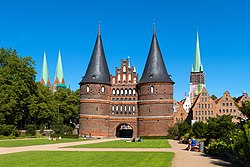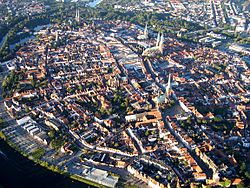Lübeck-Herrenwyk
|
Hanseatic City of Lübeck Hansestadt Lübeck |
|||
|---|---|---|---|

Holstentor, emblem of the city
|
|||
|
|||
| Coordinates: 53°52′11″N 10°41′11″E / 53.86972°N 10.68639°ECoordinates: 53°52′11″N 10°41′11″E / 53.86972°N 10.68639°E | |||
| Country | Germany | ||
| State | Schleswig-Holstein | ||
| District | Urban districts of Germany | ||
| Government | |||
| • Mayor | Bernd Saxe (SPD) | ||
| • Governing parties | CDU | ||
| Area | |||
| • Total | 214.13 km2 (82.68 sq mi) | ||
| Population (2015-12-31) | |||
| • Total | 216,253 | ||
| • Density | 1,000/km2 (2,600/sq mi) | ||
| Time zone | CET/CEST (UTC+1/+2) | ||
| Postal codes | 23501−23570 | ||
| Dialling codes | 0451, 04502 | ||
| Vehicle registration | HL (1906–1937; since 1956) | ||
| Website | www.luebeck.de | ||
| Hanseatic City of Lübeck | |
|---|---|
| Name as inscribed on the World Heritage List | |

Aerial view of the old town
|
|
| Location | Germany |
| Type | Cultural |
| Criteria | iv |
| Reference | 272 |
| UNESCO region | Europe and North America |
| Inscription history | |
| Inscription | 1987 (11th Session) |
Lübeck (pronounced [ˈlyːbɛk]) is a city in Schleswig-Holstein, northern Germany, and one of the major ports of Germany. On the river Trave, it was the leading city of the Hanseatic League, and because of its extensive Brick Gothic architecture is listed by UNESCO as a World Heritage Site. In 2015, it had a population of 218,523.
The old part of Lübeck is on an island enclosed by the Trave. The Elbe–Lübeck Canal connects the Trave with the Elbe River. Another important river near the town centre is the Wakenitz. Autobahn 1 connects Lübeck with Hamburg and Denmark. Travemünde is a sea resort and ferry port on the coast of the Baltic Sea. Lübeck Hauptbahnhof links Lübeck to a number of railway lines, notably the line to Hamburg.
Humans settled in the area around what today is Lübeck after the last Ice Age ended about 9700 BCE. Several Neolithic dolmens can be found in the area.
Around AD 700, Slavic peoples started moving into the eastern parts of Holstein, an area previously settled by Germanic inhabitants; the latter had moved on in the course of the Migration Period. Charlemagne (Holy Roman Emperor 800-814), whose efforts to Christianise the area were opposed by the Germanic Saxons, expelled many of the Saxons and brought in Polabian Slavs, allied to Charlemagne, in their stead. Liubice (the place-name means "lovely") was founded on the banks of the river Trave about four kilometres (2.5 miles) north of the present-day city-centre of Lübeck. In the 10th century it became the most important settlement of the Obotrite confederacy and a castle was built. In 1128 the pagan Rani from Rügen razed Liubice.
...
Wikipedia



